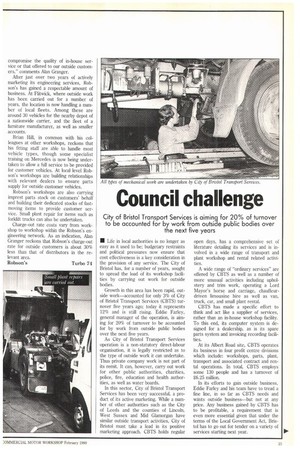Council challenge
Page 123

If you've noticed an error in this article please click here to report it so we can fix it.
City of Bristol Transport Services is aiming for 20% of turnover to be accounted for by work from outside public bodies over the next five years
• Life in local authorities is no longer as easy as it used to be; budgetary restraints and political pressures now ensure that cost effectiveness is a key consideration in the provision of any service. The City of Bristol has, for a number of years, sought to spread the load of its workshop facilities by carrying out work for outside bodies.
Growth in this area has been rapid, outside work—accounted for only 3% of City of Bristol Transport Services (CBTS) turnover five years ago; today it represents 12% and is still rising. Eddie Farley, general manager of the operation, is aiming for 20% of turnover to be accounted for by work from outside public bodies over the next five years.
As City of Bristol Transport Services operation is a non-statutory direct-labour organisation, it is legally restricted as to the type of outside work it can undertake. Thus private company work is not part of its remit. It can, however, carry out work for other public authorities, charities, police, fire, education and health authorities, as well as water boards.
In this sector, City of Bristol Transport Services has been very successful, a product of its active marketing. While a number of other authorities such as the City of Leeds and the counties of Lincoln, West Sussex and Mid Glamorgan have similar outside transport activities, City of Bristol must take a lead in its positive marketing approach. CBTS holds regular open days, has a comprehensive set of literature detailing its services and is involved in a wide range of transport and plant workshop and rental related activities.
A wide range of "ordinary services" are offered by CBTS as well as a number of more unusual activities including upholstery and trim work, operating a Lord Mayor's horse and carriage, chauffeurdriven limousine hire as well as van, truck, car, and small plant rental.
CBTS has made a specific effort to think and act like a supplier of services, rather than an in-house workshop facility. To this end, its computer system is designed for a dealership, as is its spare parts system and invoicing recording facilities.
At its Albert Road site, CBTS operates its business in four profit centre divisions which include: workshops, parts, plant, transport and associated contract and rental operations. In total, CBTS employs some 130 people and has a turnover of £6.25 million.
In its efforts to gain outside business, Eddie Farley and his team have to tread a fine line, in so far as CBTS needs and wants outside business—but not at any price. Any business gained by CBTS has to be profitable, a requirement that is even more essential given that under the terms of the Local Government Act, Bristol has to go out for tender on a variety of services starting next year.








































































































































